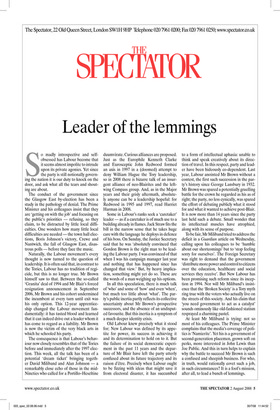Leader of the lemmings
So madly introspective and selfobsessed has Labour become that it seems almost impolite to intrude upon its private agonies. Yet since the party is still notionally governing the nation it is our duty to knock on the door, and ask what all the tears and shouting are about.
The conduct of the government since the Glasgow East by-election has been a study in the pathology of denial. The Prime Minister and his colleagues insist that they are ‘getting on with the job’ and focusing on the public’s priorities — refusing, so they claim, to be distracted by little local difficulties. One wonders how many little local difficulties are needed — the town hall elections, Boris Johnson’s victory, Crewe and Nantwich, the fall of Glasgow East, disastrous polls — before they face the music.
Naturally, the Labour movement’s every thought is now turned to the question of leadership. It is often said that, in contrast to the Tories, Labour has no tradition of regicide, but this is no longer true. Mr Brown himself saw to that. Between the so-called ‘Granita’ deal of 1994 and Mr Blair’s forced resignation announcement in September 2006, Mr Brown and his cohort undermined the incumbent at every turn until exit was his only option. This 12-year apprenticeship changed the Labour movement fundamentally: it has tasted blood and learned that it can indeed drive out a leader whom it has come to regard as a liability. Mr Brown is now the victim of the very black arts in which he schooled his party.
The consequence is that Labour’s behaviour now closely resembles that of the Tories before and immediately after the 1997 election. This week, all the talk has been of a potential ‘dream ticket’ bringing together David Miliband and Alan Johnson — a remarkably close echo of those in the midNineties who called for a Portillo–Heseltine duumvirate. Curious alliances are proposed. Just as the Europhile Kenneth Clarke and Eurosceptic John Redwood formed an axis in 1997 in a (doomed) attempt to deny William Hague the Tory leadership, so in 2008 there is bizarre talk of an insurgent alliance of neo-Blairites and the leftwing Compass group. And, as in the Major years and their grisly aftermath, absolutely anyone can be a leadership hopeful: for Redwood in 1995 and 1997, read Harriet Harman in 2008.
Some in Labour’s ranks seek a ‘caretaker’ leader — as if a caretaker is of much use to a building already in flames. Jack Straw fits the bill in the narrow sense that he takes huge care with the language he deploys in defence of his boss. On Sunday, the Justice Secretary said that he was ‘absolutely convinced that Gordon Brown is the right man to be leading the Labour party. I was convinced of that when I was his campaign manager last year and nothing that has happened since has changed that view.’ But, by heavy implication, something might yet do so. These are the words of a man weighing up his options.
In all this speculation, there is much talk of ‘who’ and some of ‘how’ and even ‘when’, but much too little about ‘what’. The party’s public inertia partly reflects its collective uncertainty about Mr Brown’s prospective successors, and the absence of an undisputed favourite. But this inertia is a symptom of a much deeper identity crisis.
Old Labour knew precisely what it stood for; New Labour was defined by its appetite for power, its success in achieving it and its determination to hold on to it. But the failure of its social democratic experiment in the past 11 years and the departure of Mr Blair have left the party utterly confused about its future trajectory and its raison d’être. Precisely when Labour ought to be fizzing with ideas that might save it from electoral disaster, it has succumbed to a form of intellectual aphasia: unable to think and speak creatively about its direction of travel. In this respect, party and leader have been hideously co-dependent. Last year, Labour anointed Mr Brown without a contest, the first such succession in the party’s history since George Lansbury in 1932. Mr Brown was spared a potentially gruelling battle for the crown he regarded as his as of right; the party, no less cynically, was spared the effort of debating publicly what it stood for and what it wanted to achieve post-Blair. It is now more than 14 years since the party last held such a debate. Small wonder that its intellectual muscles have atrophied, along with its sense of purpose.
To be fair, Mr Miliband tried to address the deficit in a Guardian article on Wednesday, calling upon his colleagues to be ‘humble about our shortcomings’ but to ‘stop feeling sorry for ourselves’. The Foreign Secretary was right to demand that the government ‘distribute more power and control to citizens over the education, healthcare and social services they receive’. But New Labour has been promising such reform since its inception in 1994. Nor will Mr Miliband’s insistence that the ‘Broken Society’ is a Tory myth ring true with the voters who actually live on the streets of this society. And his claim that ‘you need government to act as a catalyst’ sounds ominously like old-fashioned statism resprayed a charming pastel.
At least Mr Miliband is trying: not so most of his colleagues. The Prime Minister complains that the media’s coverage of politics is ‘Namierite’. Yet his is a government of second-generation placemen, grown soft on perks, more interested in John Lewis than Joe Public. And this in turn helps to explain why the battle to succeed Mr Brown is such a confused and sheepish business. For who, in truth, would rationally covet such a job, in such circumstances? It is a fool’s mission, after all, to lead a bunch of lemmings.


























































 Previous page
Previous page